-
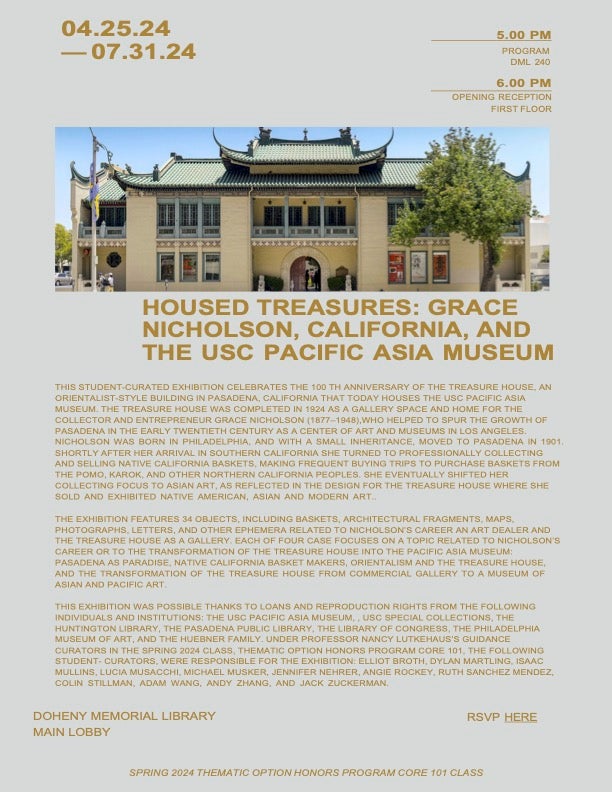
Students in Professor Nancy Lutkehaus’ Thematic Options Core 101 class are excited to announce the opening on Thursday, April 25th of their student-curated exhibition “Housed Treasures: Grace Nicholson, California, and the USC Pacific Asia Museum.”
The exhibition, in celebration of the 100th anniversary of the “Treasure House”—now known as the USC Pacific Asia Museum—examines the life and legacy of Grace Nicholson, the collector and gallerist who built the Treasure House in 1924.
The program will feature the student curators of the exhibition and guest speakers, including Bethany Montagano, Director of USC Museums; William Deverell, Director of the Huntington-USC Institute on California and the West, Sonya Lee, Professor of Art History and Director of East Asian Languages and Culture, Karin Huebner, Director of Programs for the Harman Academy For Polymathic Study, and Rebecca Hall, Curator of the Pacific Asia Museum.
An opening program will be held in DML 240 at 5:00 pm, followed by a reception at 6:00 pm Thursday April 25th.
Event Address:
Doheny Memorial Library
3550 Trousdale Parkway, University Park CampusContact us at lmusacch@usc.edu, ruthdsan@usc.edu, or ebroth@usc.edu if you have any questions.
Suggested On-Campus Parking: USC McCarthy Way Parking Structure, 620 USC McCarthy Way, Los Angeles, CA 90089
-
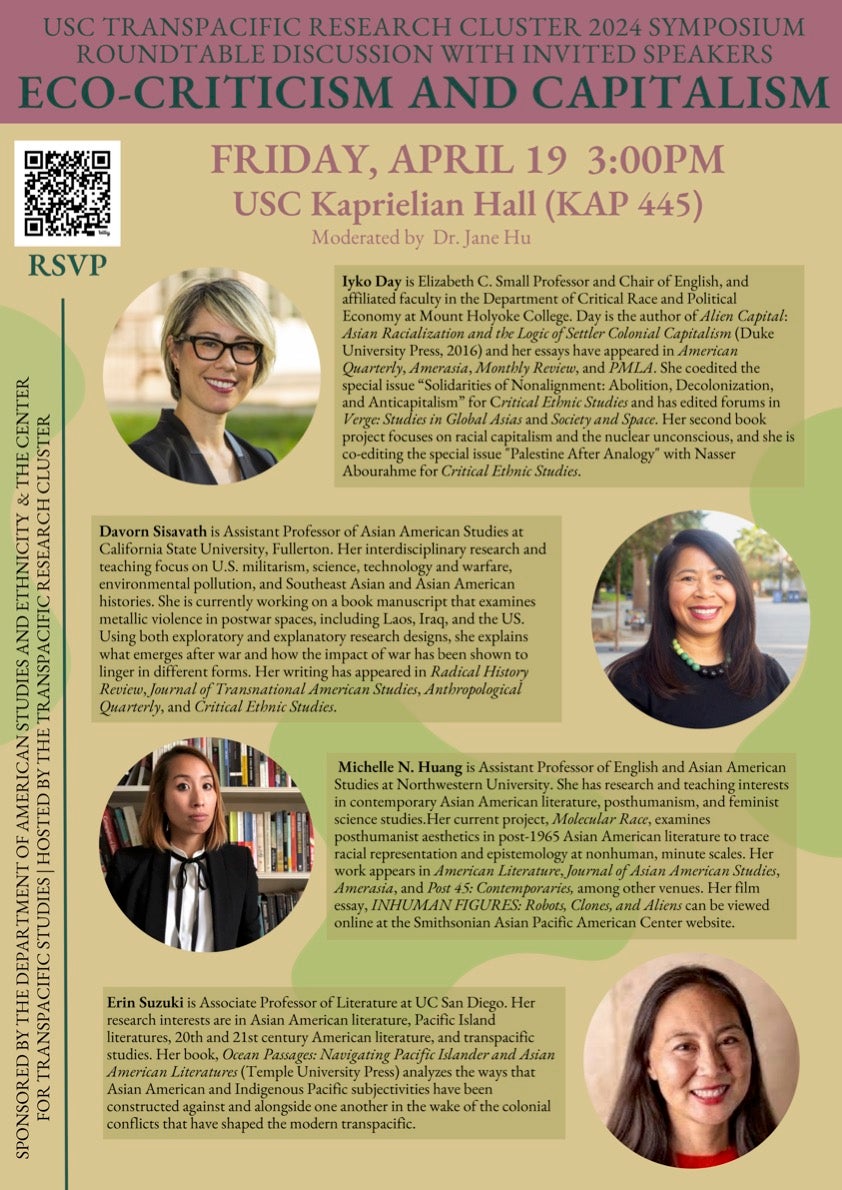
Lyko Day is Elizabeth C. Small Professor and Chair of English, and affiliated faculty in the Department of Critical Race and Political Economy at MountHolyoke College. Day is the author of Alien Capital: Asian Racialization and the Logic of Settler Colonial Capitalism (Duke University Press, 2016) and her essays have appearedin American Quarterly, Amerasia, Monthly Review, and PMLA. She coedited the special issue “Solidarities of Nonalignment: Abolition, Decolonization, and Anticapitalism” for Critical Ethnic Studies and has edited forums in Verge: Studies in Global Asias and Society and Space. Her second book project focuses on racial capitalism and the nuclear unconscious, and she is co-editing the special issue “Palestine After Analogy” with Nasser Abourahme for Critical Ethnic Studies.
Davorn Sisavath is Assistant Professor of Asian American Studies at California State University, Fullerton. Her interdisciplinary research and teaching focus on U.S. militarism, science, technology and warfare, environmental pollution, and Southeast Asian and Asian American histories. She is currently working on a book manuscript that examines metallic violence in postwar spaces, including Laos, Irag, and the US. Using both exploratory and explanatory research designs, she explains what emerges after war and how the impact of warhas been shown to linger in different forms. Her writing has appeared in Radical History Review,Journal of Transnational American Studies, Anthropological Quarterly, and Critical Ethnic Studies.
Michelle N. Huang is AssistantProfessor of English and Asian American Studies at Northwestern University. She has research and teaching interests in contemporary Asian American literature, posthumanism, and feminist science studies. Her current project, MolecularRace, examines posthumanist aesthetics in post-1965 Asian American literature to trace racial representation and epistemology at nonhuman, minute scales. Her work appears in American Literature, Journal of Asian American Studies, Amerasia, and Post 45: Contemporaries, among other venues. Her film essay, INHUMAN FIGURES: Robots, Clones, and Aliens can be viewed online at the Smithsonian Asian Pacific American Center website.
Erin Suzuki is Associate Professor of Literature at UC San Diego. Her research interests are in Asian American literature, Pacific Island literatures, 20th and 21st century American literature, and transpacific studies. Her book, Ocean Passages: Navigating Pacific Islander and Asian American Literatures (Temple University Press) analyzes the ways that Asian American and Indigenous Pacific subjectivities have been constructed against and alongside one another in the wake of the colonial conflicts that have shaped the modern transpacific.
Moderated by Dr. Jane Hu
FRIDAY, APRIL 19, 3:00PM
USC Kaprielian Hall (KAP 445)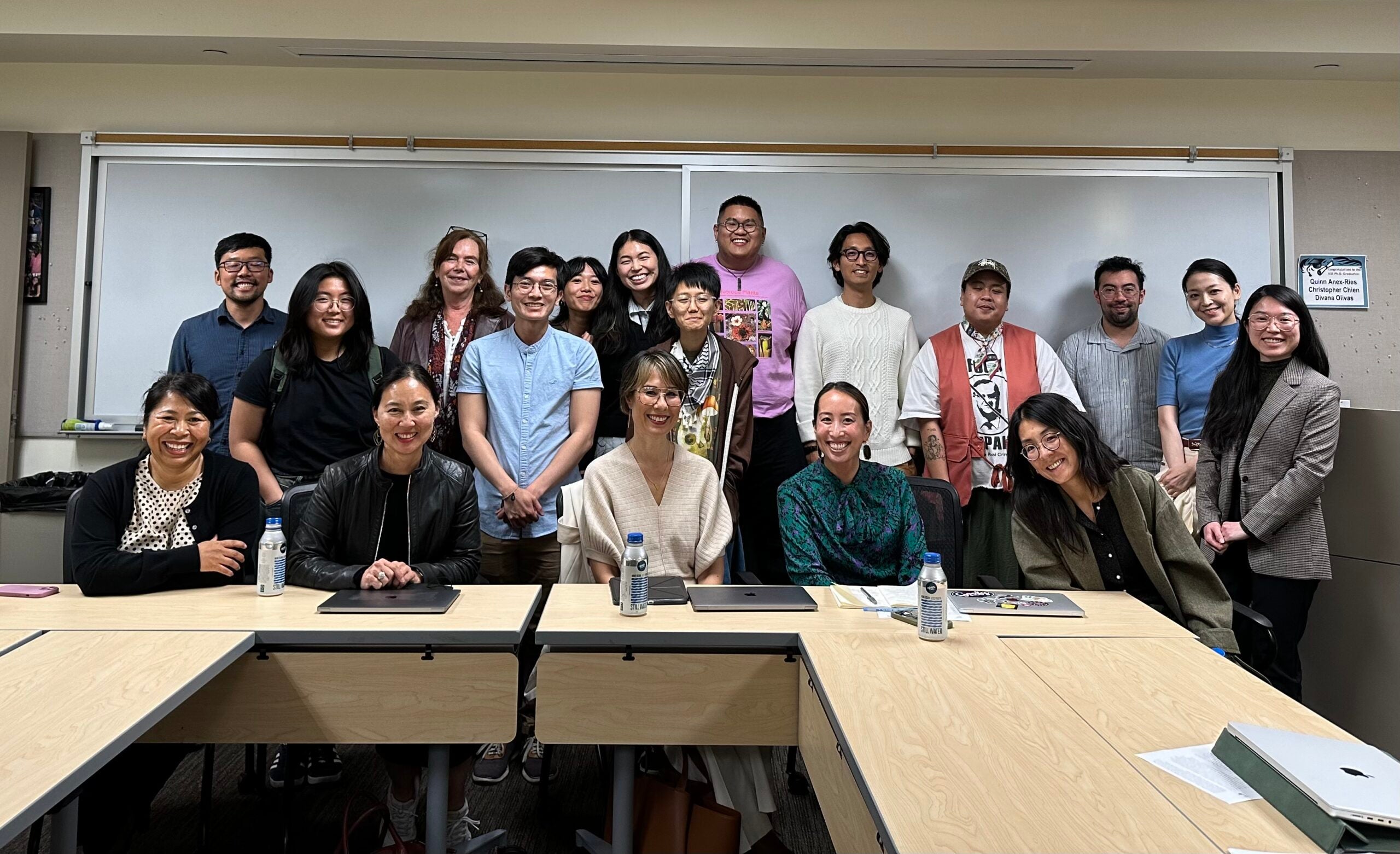
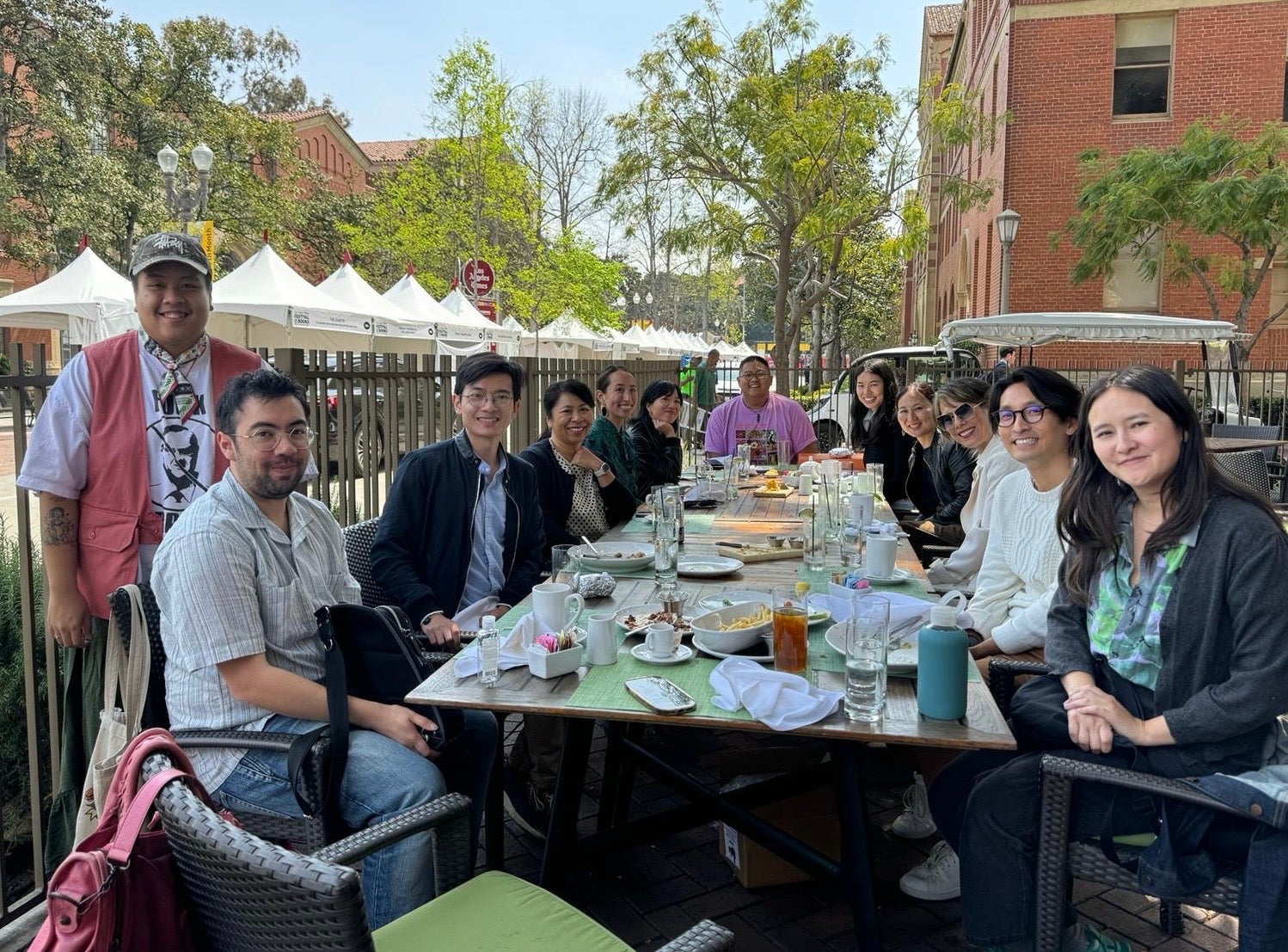
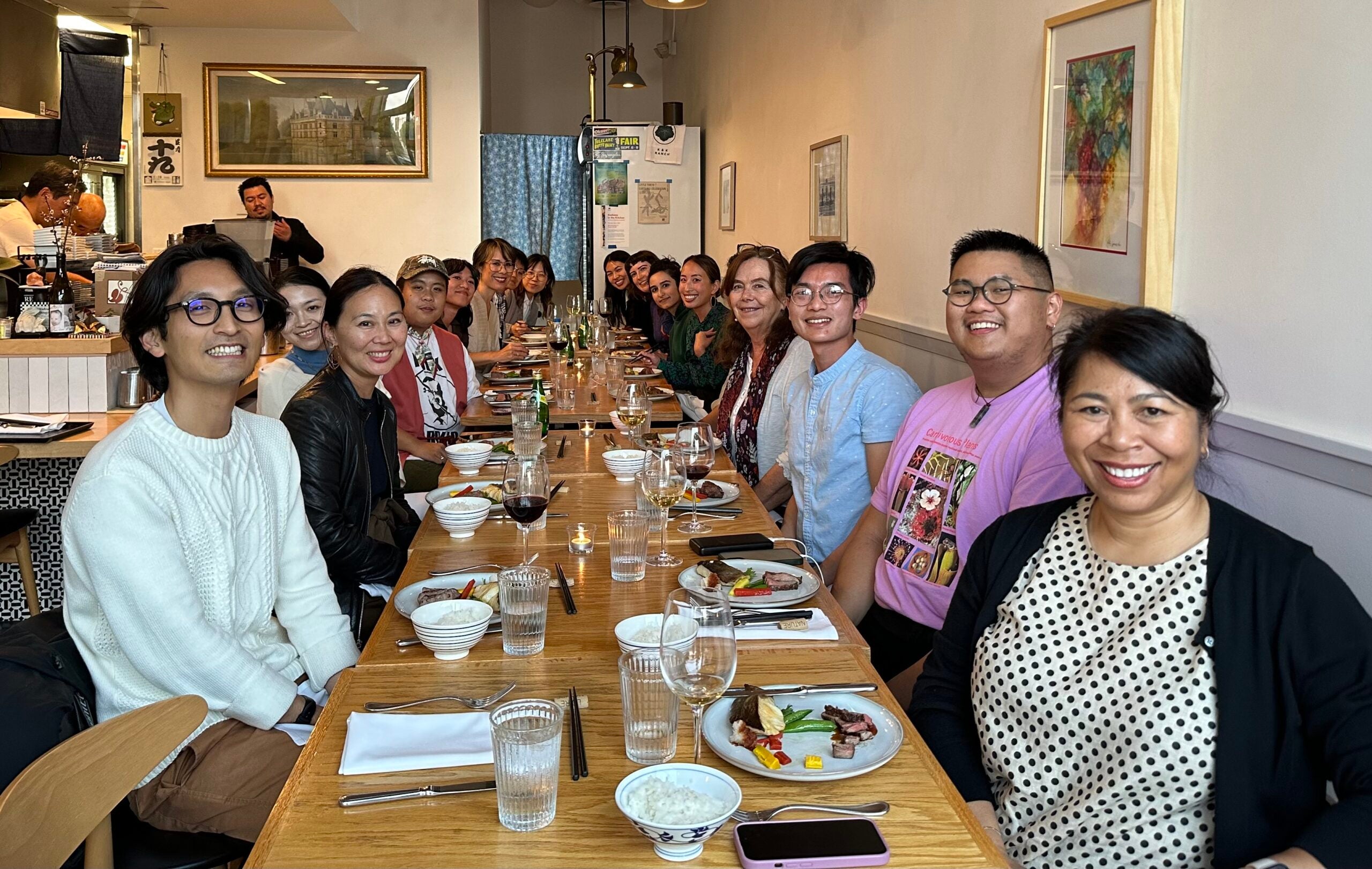
-
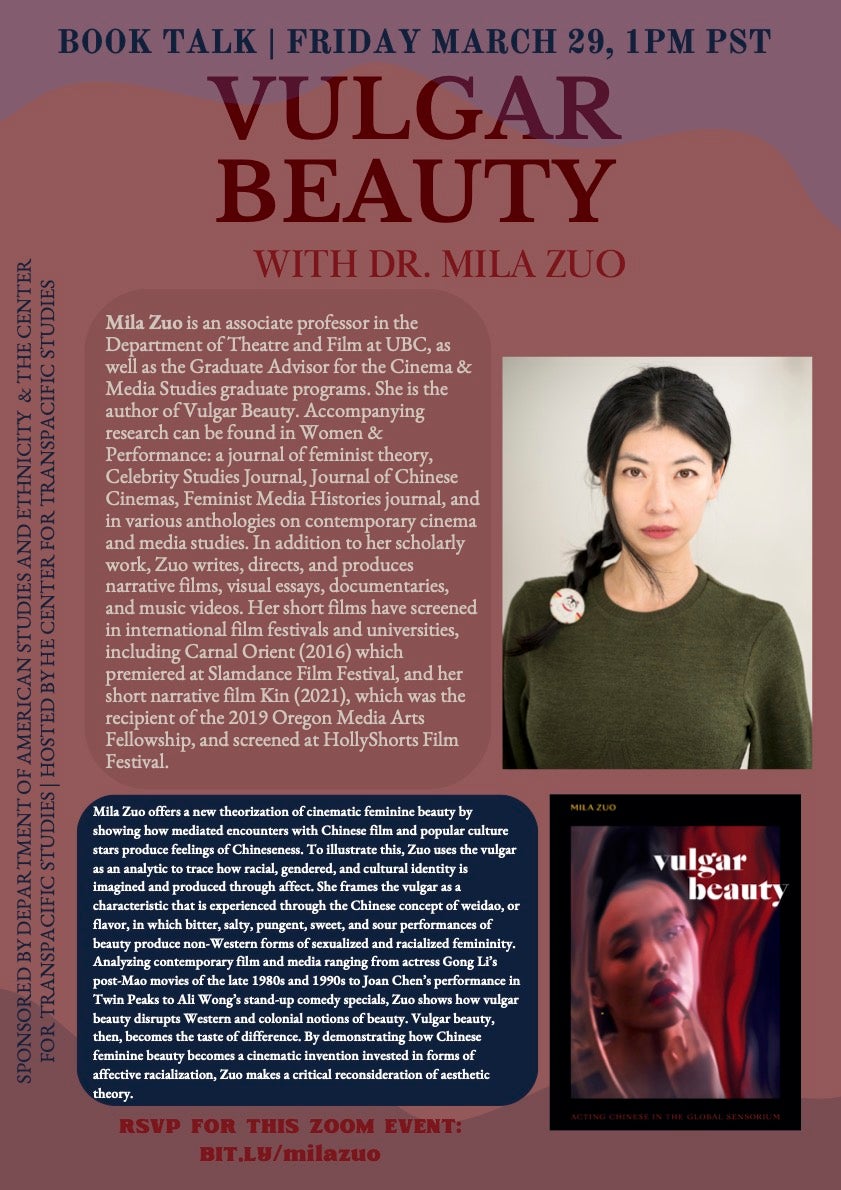
Mila Zuo is an associate professor in the Department of Theatre and Film at UBC, as well as the Graduate Advisor for the Cinema & Media Studies graduate programs. She is the author of Vulgar Beauty. Accompanying research can be found in Women & Performance: a journal of feminist theory, Celebrity Studies Journal, Journal of Chinese Cinemas, Feminist Media Histories journal, and in various anthologies on contemporary cinema and media studies. In addition to her scholarly work, Zuo writes, directs, and produces narrative films, visual essays, documentaries, and music videos. Her short films have screened in international film festivals and universities, including Carnal Orient (2016) which premiered at Slamdance Film Festival, and her short narrative film Kin (2021), which was the recipient of the 2019 Oregon Media Arts Fellowship, and screened at HollyShorts Film Festival.
Mila Zuo offers a new theorization of cinematic feminine beauty by showing how mediated encounters with Chinese film and popular culture stars produce feelings of Chineseness. To illustrate this, Zuo uses the vulgar as an analytic to trace how racial, gendered, and cultural identity is imagined and produced through affect. She frames the vulgar as a characteristic that is experienced through the Chinese concept of weidao, or flavor, in which bitter, salty, pungent, sweet, and sour performances of beauty produce non-Western forms of sexualized and racialized femininity. Analyzing contemporary film and media ranging from actress Gong Li’s post-Mao movies of the late 1980s and 1990s to Joan Chen’s performance in Twin Peaks to Ali Wong’s stand-up comedy specials, Zuo shows how vulgar beauty disrupts Western and colonial notions of beauty. Vulgar beauty, then, becomes the taste of difference. By demonstrating how Chinese feminine beauty becomes a cinematic invention invested in forms of affective racialization, Zuo makes a critical reconsideration of aesthetic theory.
Co-organized by the Department of American Studies and Ethnicity & The Center for Transpacific Studies.
Friday March 29, 1pm PST
RSVP: bitly.ly/milazuo
-
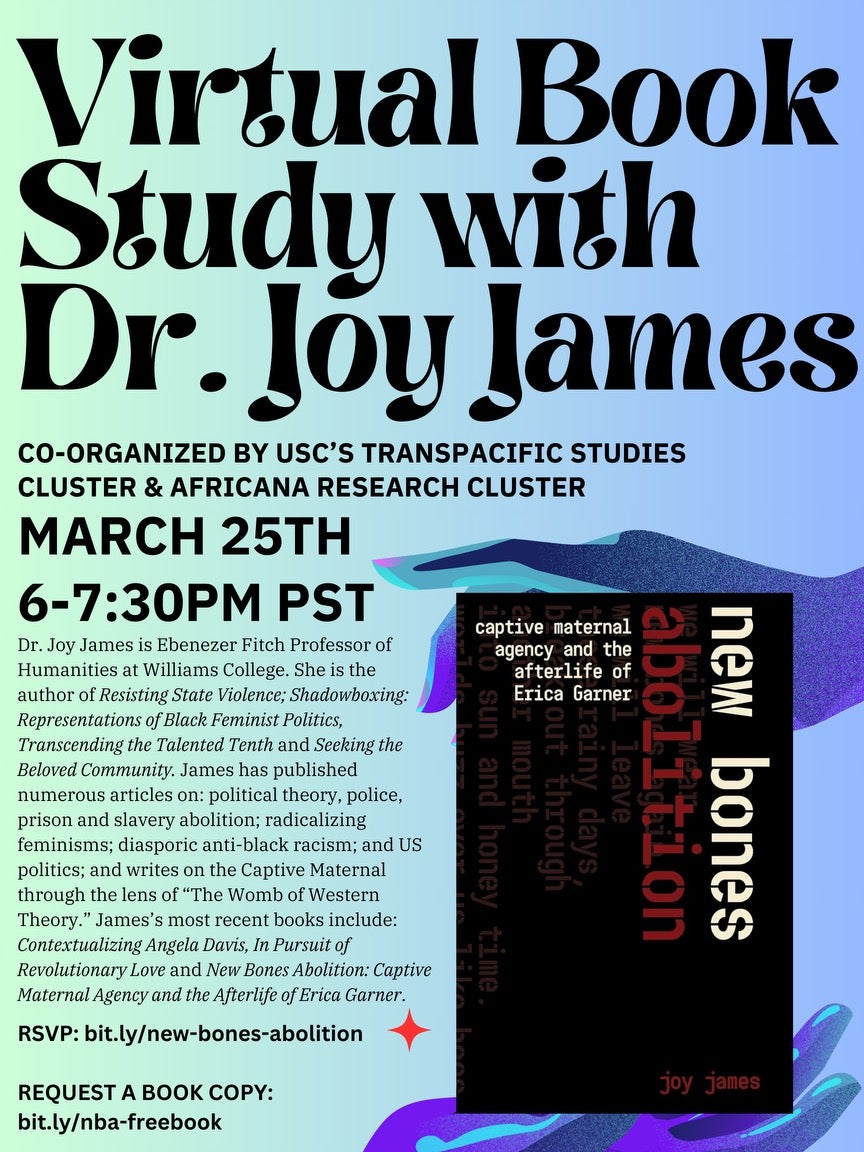
Dr. Joy James is Ebenezer Fitch Professor of Humanities at Williams College. She is the author of Resisting State Violence; Shadowboxing:
Representations of Black Feminist Politics, Transcending the Talented Tenth and Seeking the Beloved Community. James has published numerous articles on: political theory, police, prison and slavery abolition; radicalizing feminisms; diasporic anti-black racism; and US politics; and writes on the Captive Maternal through the lens of “The Womb of Western Theory.” James’s most recent books include:
Contextualizing Angela Davis, In Pursuit of Revolutionary Love and New Bones Abolition: Captive Maternal Agency and the Afterlife of Erica Garner.
Co-organized by USC Transpacific Studies
Cluster & Africana Research ClusterMarch 25th, 6-7:30PM PST
RSVP: bit.ly/new-bones-abolition
-
The Transpacific Studies Research Cluster is excited to announce book talk on Surface Relations, with Dr. Vivian Huang, two Fridays from now, on March 1st at 1pm PST. RSVP link: bit.ly/surface-relations

-
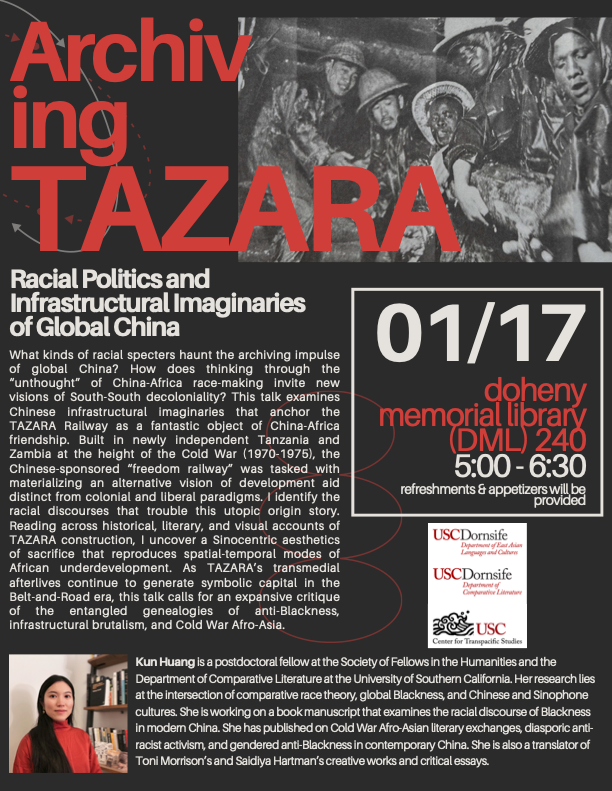
-

-
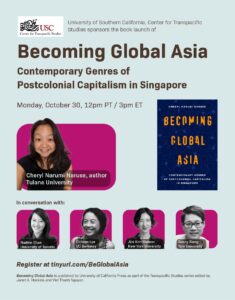
-
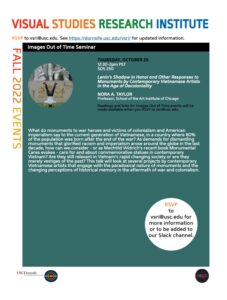
-
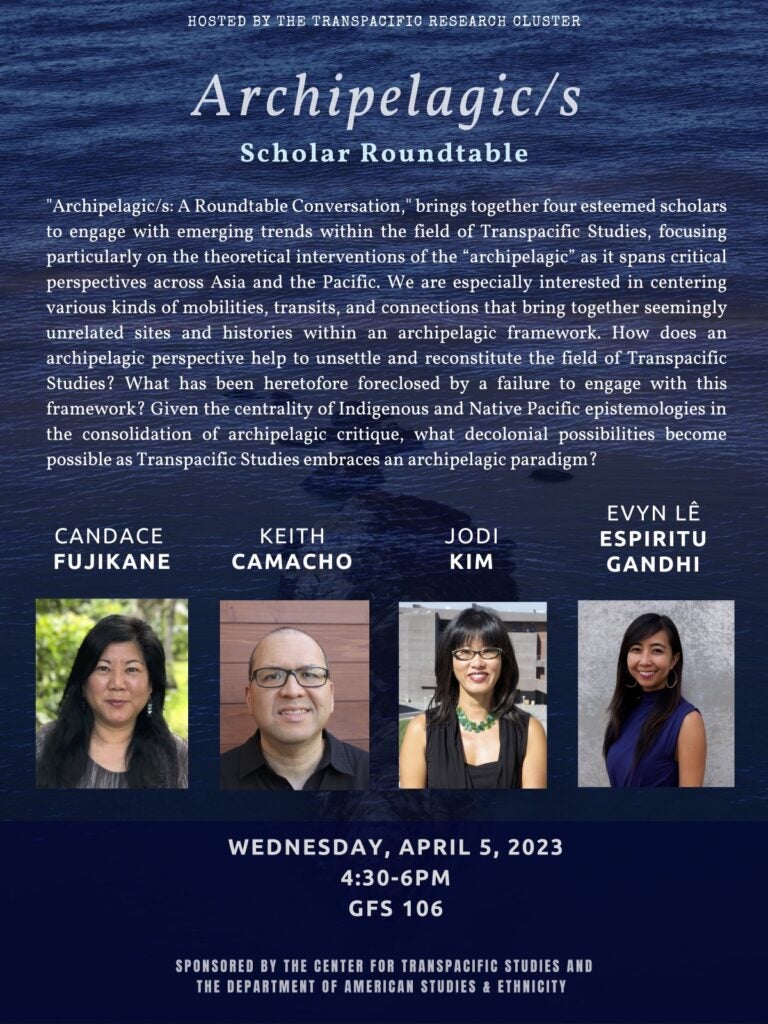
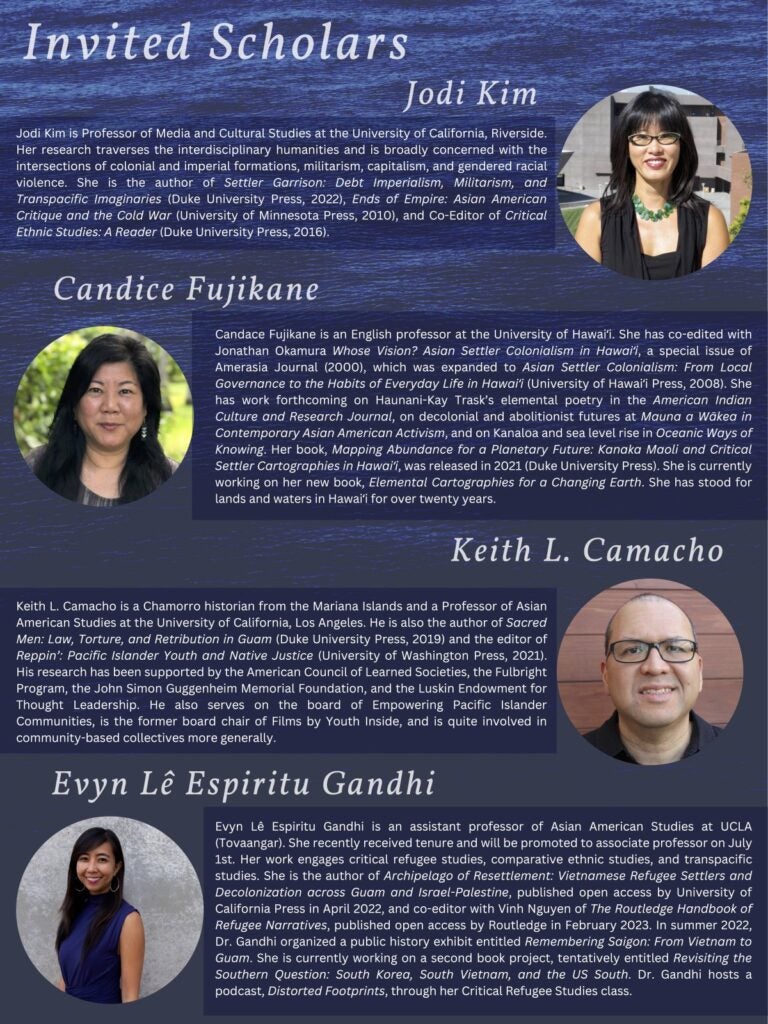
-
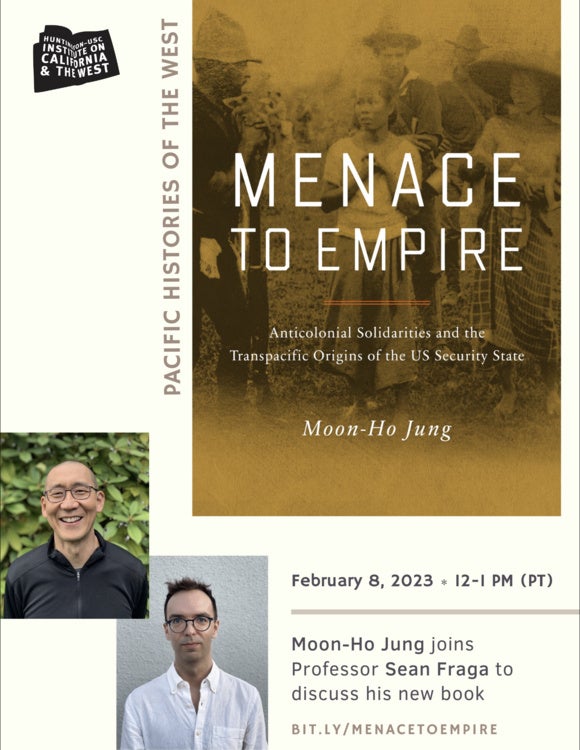
-
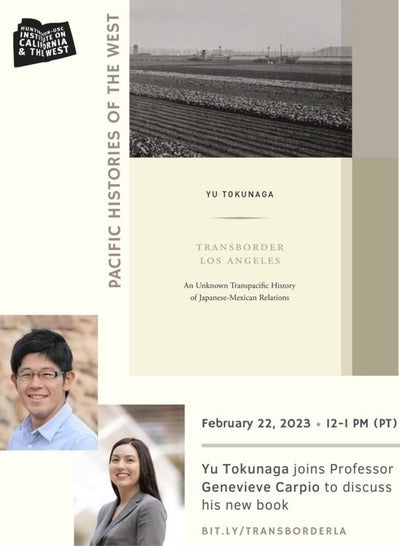
-
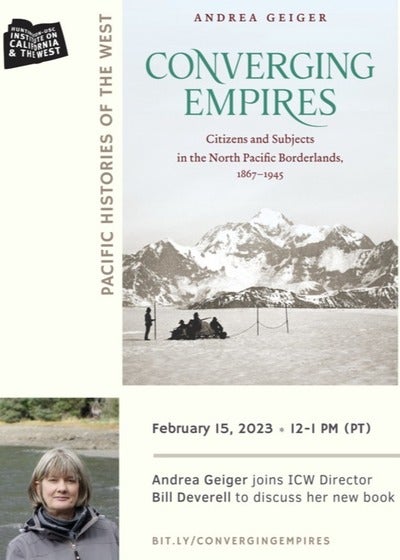
-
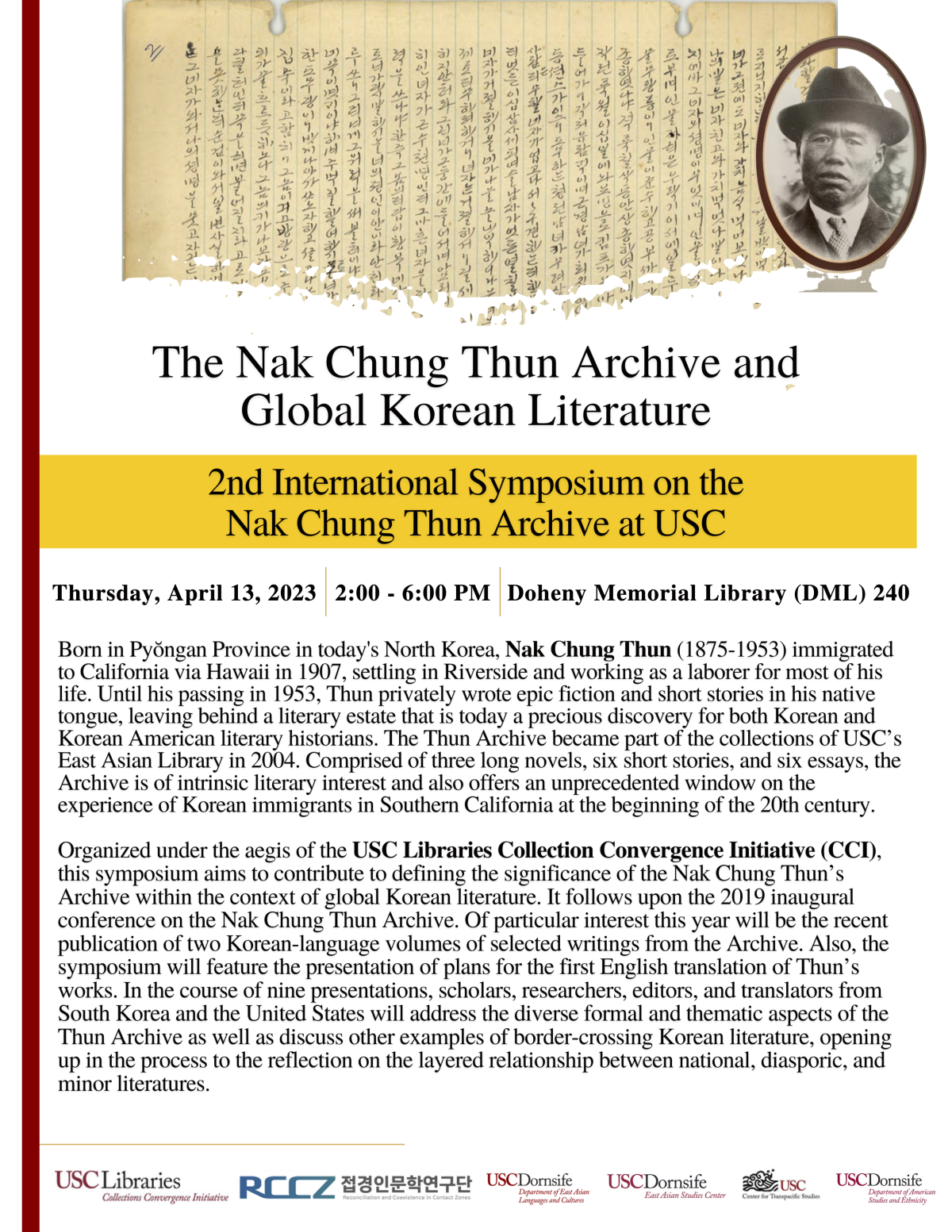
-
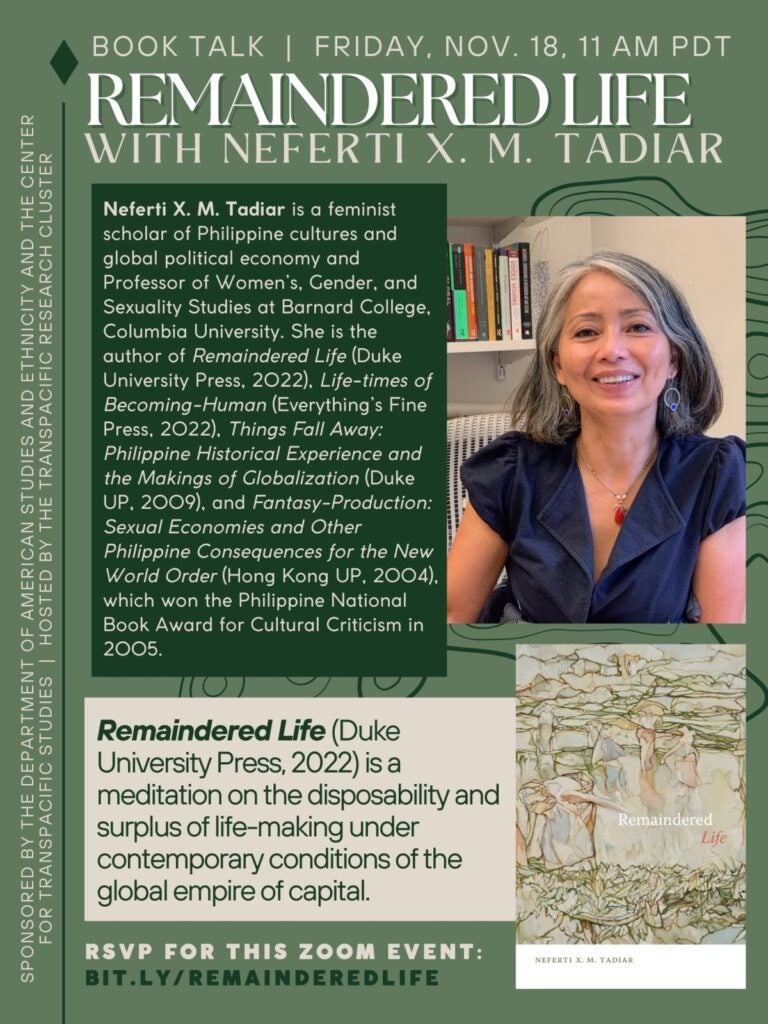 Neferti X. M. Tadiar is a feminist scholar of Philippine cultures and global political economy and Professor of Women’s, Gender, and Sexuality Studies at Barnard College, Columbia University. She is the author of Remaindered Life (Duke University Press, 2022), Life-times of Becoming-Human (Everything’s Fine Press, 2022), Things Fall Away: Philippine Historical Experience and the Makings of Globalization (Duke UP, 2009), and Fantasy-Production: Sexual Economies and Other Philippine Consequences for the New World Order (Hong Kong UP, 2004), which won the Philippine National Book Award for Cultural Criticism in 2005.
Neferti X. M. Tadiar is a feminist scholar of Philippine cultures and global political economy and Professor of Women’s, Gender, and Sexuality Studies at Barnard College, Columbia University. She is the author of Remaindered Life (Duke University Press, 2022), Life-times of Becoming-Human (Everything’s Fine Press, 2022), Things Fall Away: Philippine Historical Experience and the Makings of Globalization (Duke UP, 2009), and Fantasy-Production: Sexual Economies and Other Philippine Consequences for the New World Order (Hong Kong UP, 2004), which won the Philippine National Book Award for Cultural Criticism in 2005.Remaindered Life (Duke University Press, 2022) is a meditation on the disposabilitv and surplus of life-making under contemporary conditions of the global empire of capital.
RSVP For This Zoom Event:
bit.ly/remainderedlife
-

EASC Guest Speaker Series: Marylyn Tan and Brian Bernards
Queer, female, and Chinese, Marylyn Tan is a linguistics graduate, poet, and artist who has been performing and disappointing since 2014. Her work trades in the conventionally vulgar, radically pleasurable, and unsanctioned, striving to emancipate and restore the alienated, endangered body. Tan is the poetry reader for Singapore Unbound, founder of multidisciplinary arts collective DIS/CONTENT (hellodiscontent.carrd.com), and can be found in her habitat at instagr.am/marylyn.orificial or facebook.com/mrylyn. She lives in Singapore.
In 2020, this debut volume [Gaze Back] shocked Singapore’s literary world by winning the country’s premier English-language poetry prize, making its then twenty-seven-year-old author the first woman to ever win the award. Moreover, it is not a polite book. It is an instruction book, a grimoire, a call to insurrection to wrest power back from the social structures that serve to restrict, control, and distribute it among those few privileged above the disenfranchised. It is a poetic call to arms.
This event is co-sponsored by the Center for Transpacific Studies, East Asian Languages and Cultures Department and the East Asian Studies Center.
(Photo Credit: Rikei Caraphina )
To add this event to your calendar, click the date(s) below.
4:00 PM to 5:30 PM
University Park Campus
Social Sciences Building (SOS)
SOS 250
Friday, November 11, 2022 | 4:00PM-5:30PM | SOS 250 | RSVP
-
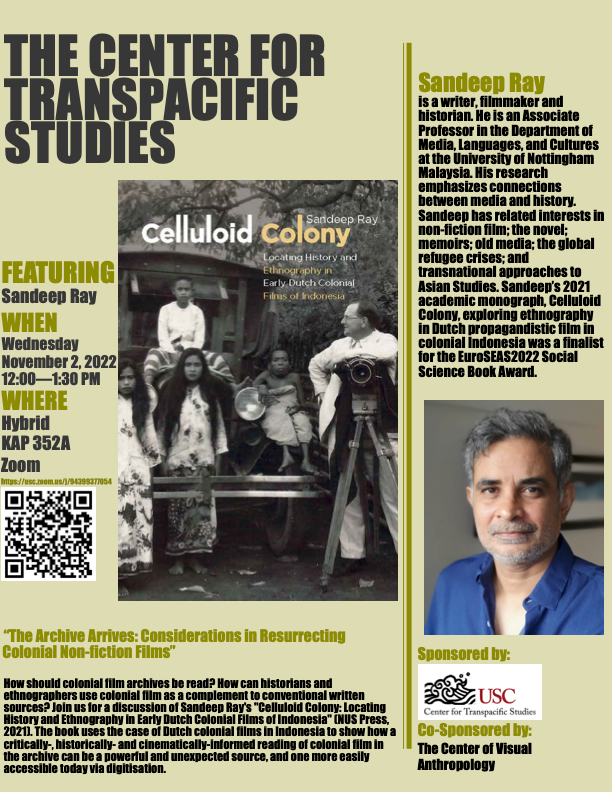
November 2nd, 2022
Presented by: Sandeep Ray
How should colonial film archives be read? How can historians and ethnographers use colonial film as a complement to conventional written sources? Join us for a discussion of Sandeep Ray’s “Celluloid Colony: Locating History and Ethnography in Early Dutch Colonial Films of Indonesia” (NUS Press, 2021). The book uses the case of Dutch colonial films in Indonesia to show how a critically-, historically- and cinematically-informed reading of colonial film in the archive can be a powerful and unexpected source, and one more easily accessible today via digitisation.
-
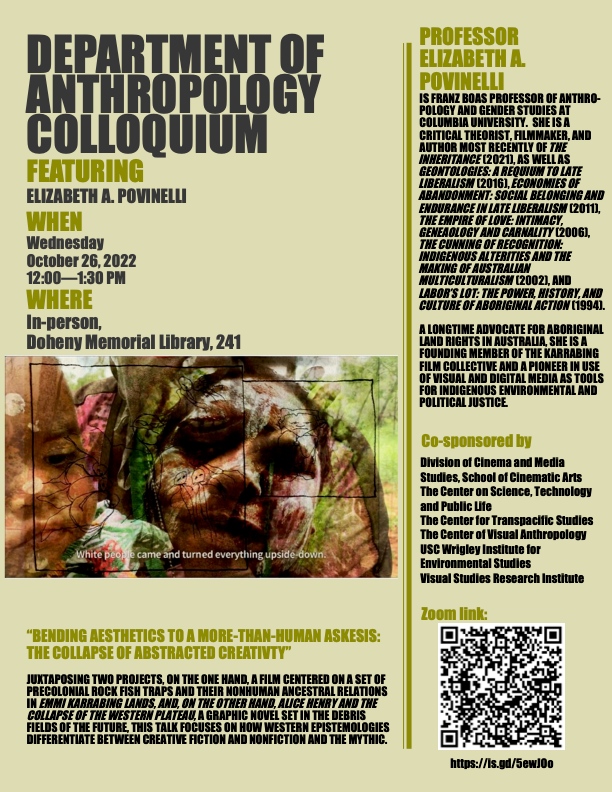
October 26th, 2022
Presented by: Professor Elizabeth A. Povinelli
Juxtaposing two projects, on the one hand, a film centered on a set of precolonial rock fish traps and their nonhuman ancestral relations in emmi karrabing lands, and, on the other hand, alice henry and the collapse of the western plateau, a graphic novel set in the debris fields of the future, this talk focuses on how western epistemologies differentiate between creative fiction and nonfiction and the mythic.
-
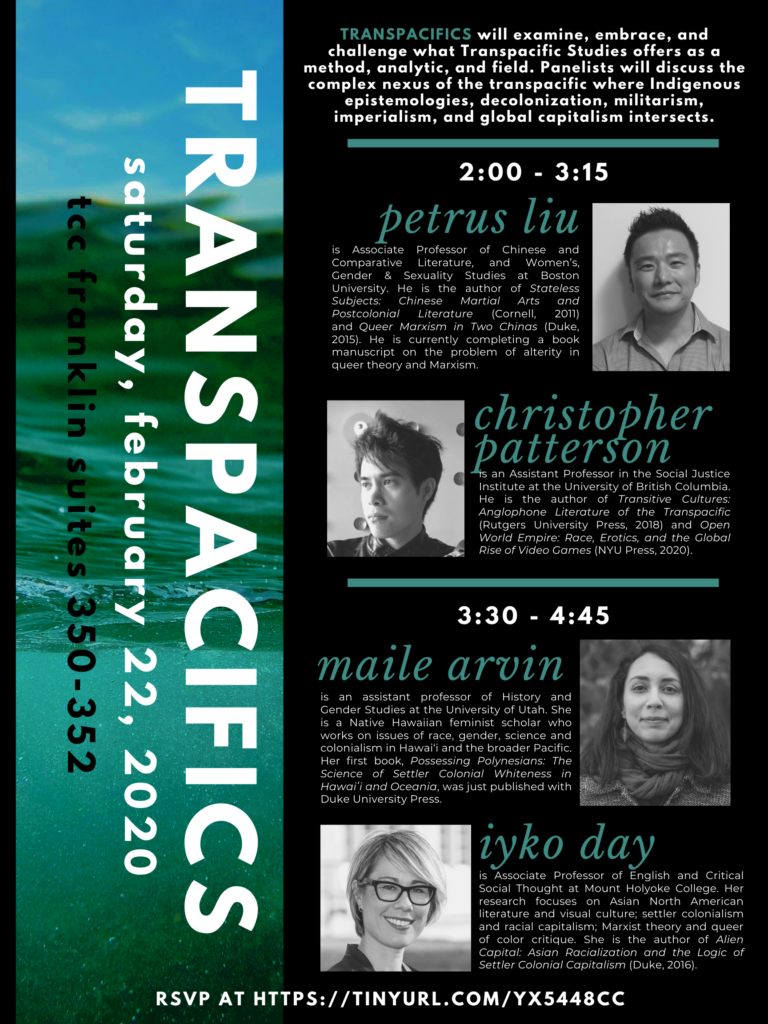
October 7th, 2022
KAP 352 Anthropology Conference Room
Schedule:
11:00 am Introductions
11:05. Presentations on Research (5-10 minutes each):-
Tera Paramehta (on Zoom, 2 am in Indonesia)
Lucas Iberico Lozada (on Zoom)
Ann Ngoc Tran
Katherine Hammitt
Karilynne Ejercito
Lina Nie
Lillian Ngan (on Zoom)
Brooke McCallum (on Zoom)
Jason Vu
Jeremy Chua (on Zoom)
Kaiyang Xu (on Zoom)
Dissertation Fellows:
Chris Chien
Rio Katayama
12:00 Lunch of salad, sandwiches and ice water provided
Informal discussion of speakers, other activities you would like funded
Coordination with Transpacific cluster in ASE
-
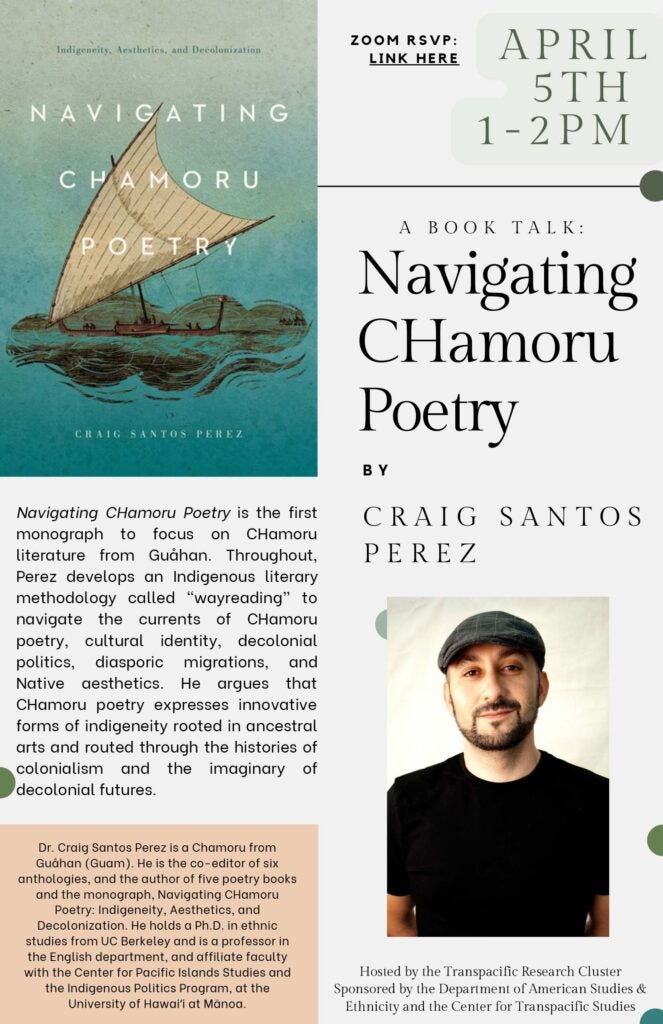
-
Thursday, March 3, 2022 | 4:00PM – 5:00PM | Online | Zoom Registration | Event Page
As beautiful and varied as an archipelago, barangay:an offshore poem (Wolsak & Wynn, 2021) is an elegant new collection of poetry from Adrian De Leon that gathers in and arranges difficult pieces of a scattered history. Adrian De Leon, Assistant Professor of American Studies and Ethnicity will enter in conversation with Craig Santos Perez, Associate Professor of English and Chair of the Hawaiian, Asian, and Pacific Islander Board in the Office of General Education at the University of Hawai’i, Mānoa.
While mourning the loss of his grandmother who “lived, loved and grieved in three languages,” De Leon skips his barangay, which is both a boat and an administrative unit in the Philippine government, over the history of both his family and a nation. In these poems De Leon considers the deadly impact of colonialism, the far-reaching effects of the diaspora from the Philippines and the personal loss of his ability to speak Ilokano, his grandmother’s native tongue. These are spare, haunting poems, which wash over the reader like the waves of the ocean the barangays navigated long ago and then pull the reader into their current like the rivers De Leon left behind.
Recent and Upcoming Events
Contact Us
Janet Alison Hoskins
Professor of Anthropology and Religion
Director, Center for Transpacific Studies
Email: jhoskins@usc.edu
Location
University of Southern California
3620 S. Vermont Ave, KAP 352
Los Angeles, Ca 90089-2532